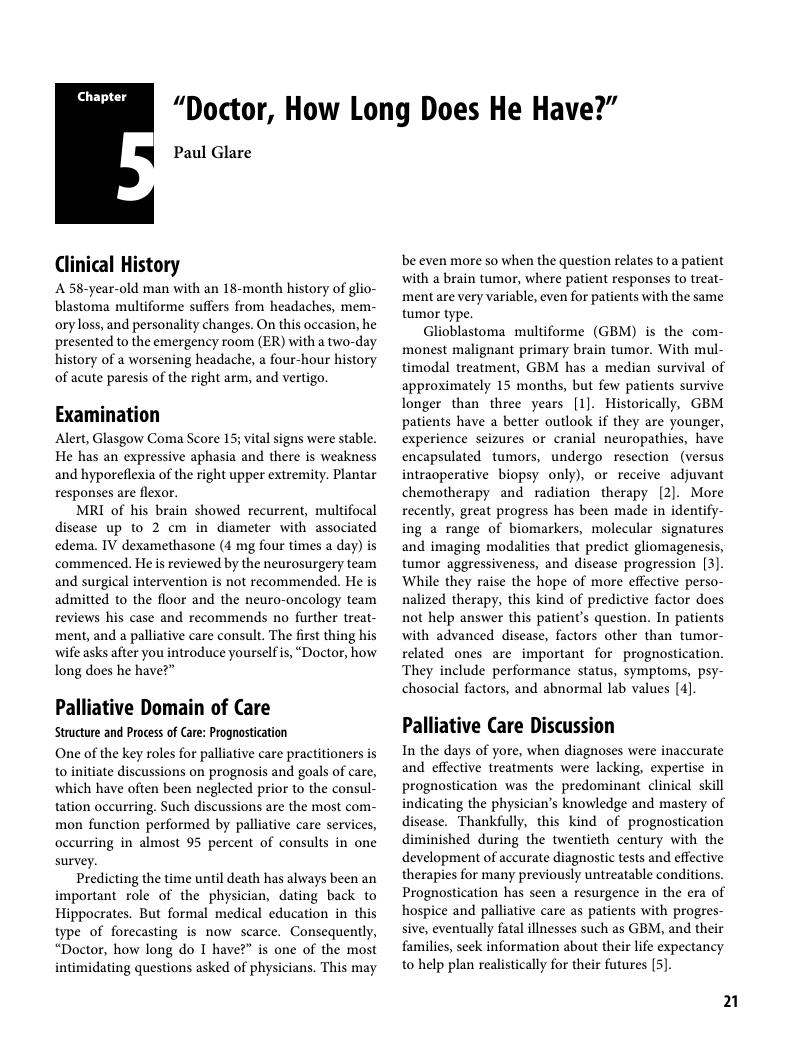Book contents
- Case Studies in Neuropalliative Care
- Case Studies in Neuropalliative Care
- Copyright page
- Contents
- Contributors
- Section 1 Palliative Care Principles
- Chapter 1 The Role of Palliative Medicine in Neuropalliative Care
- Chapter 2 Common Challenges in a Palliative Medicine Consultation
- Chapter 3 When Is the Right Time to Give Up?
- Chapter 4 A Request for Cognitive Enhancement
- Chapter 5 “Doctor, How Long Does He Have?”
- Chapter 6 “Will I Walk Again?”
- Chapter 7 Prolonged Grief Following the Death of a Spouse
- Chapter 8 Mitigating Bereavement Risk Following a Sudden Death
- Chapter 9 “I’m Praying for a Miracle”
- Chapter 10 “Should His Devices Be Deactivated?”
- Chapter 11 “Is It Time for Hospice?”
- Section 2 Cerebrovascular Diseases
- Section 3 Neurodegenerative and Neuromuscular Diseases
- Section 4 Neuro-oncology
- Section 5 Pediatric Neurology
- Section 6 Demyelinating Diseases and Autoimmune Neurology
- Index
- References
Chapter 5 - “Doctor, How Long Does He Have?”
from Section 1 - Palliative Care Principles
Published online by Cambridge University Press: 08 June 2018
- Case Studies in Neuropalliative Care
- Case Studies in Neuropalliative Care
- Copyright page
- Contents
- Contributors
- Section 1 Palliative Care Principles
- Chapter 1 The Role of Palliative Medicine in Neuropalliative Care
- Chapter 2 Common Challenges in a Palliative Medicine Consultation
- Chapter 3 When Is the Right Time to Give Up?
- Chapter 4 A Request for Cognitive Enhancement
- Chapter 5 “Doctor, How Long Does He Have?”
- Chapter 6 “Will I Walk Again?”
- Chapter 7 Prolonged Grief Following the Death of a Spouse
- Chapter 8 Mitigating Bereavement Risk Following a Sudden Death
- Chapter 9 “I’m Praying for a Miracle”
- Chapter 10 “Should His Devices Be Deactivated?”
- Chapter 11 “Is It Time for Hospice?”
- Section 2 Cerebrovascular Diseases
- Section 3 Neurodegenerative and Neuromuscular Diseases
- Section 4 Neuro-oncology
- Section 5 Pediatric Neurology
- Section 6 Demyelinating Diseases and Autoimmune Neurology
- Index
- References
Summary

- Type
- Chapter
- Information
- Case Studies in Neuropalliative Care , pp. 21 - 26Publisher: Cambridge University PressPrint publication year: 2018



